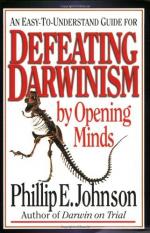|
This section contains 1,305 words (approx. 5 pages at 300 words per page) |

|
Darwinism in Science Fiction
Summary: The illustration of complimentary science fiction and Darwinism writing can be found in Ender's Game, by Orson Scott Card, War of the Worlds, by H.G. Wells, and various short stories, including Greg Bear's Blood Music.
In the mid-19th century, Charles Darwin changed the world with his revolutionary and controversial theory of evolution in his book Origin of Species, which introduced survival of the fittest, the competition for survival or predominance, and natural selection, where individual organisms with favorable traits are more likely to survive and reproduce, to a predominantly religious public. The theory was found sacrilegious and heretical and was banned from school curriculums for a century afterwards. Darwin's theories later became relevant to society itself, thus defining Social Darwinism, a concept in social theory which states that Darwin's evolutionary theories of biological traits can be applied to competition between societies or groups economically and politically. Likewise, both classic and contemporary science fiction writing reference and exemplify Darwinism relentlessly, attesting that that science fiction and Darwinism are complimentary to each other; both Darwinism and science fiction writing deal with progression and change...
|
This section contains 1,305 words (approx. 5 pages at 300 words per page) |

|


